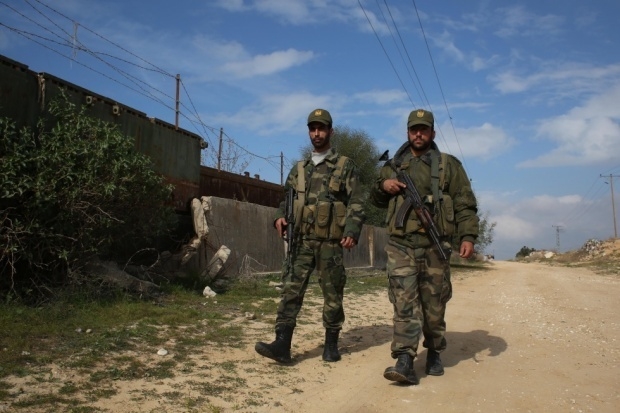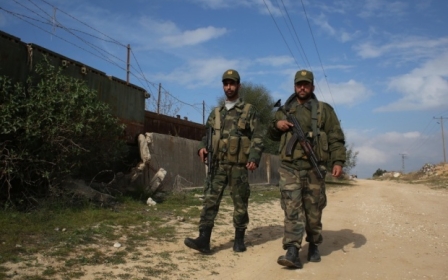Palestinian activists declare hunger strike in PA prison as anger mounts in West Bank

Six Palestinian activists have begun a hunger strike demanding their immediate release, after being held without charge and tortured for more than six months by the Palestinian Authority, according to a Ramallah-based prisoner and human rights group.
The hunger strike comes amid mounting opposition to the PA in the West Bank.
Thousands of Palestinians turned a funeral procession last Sunday in the city of Nablus into a protest against the PA, after a former Fatah leader was allegedly beaten to death by PA security forces.
The six activists were all part of the al-Harak al-Shababi youth movement, which was recently designated a terrorist organisation by the Israeli government.
The group had been labelled a "threat to Israel and the PA" by Israeli Foreign Minister Avigdor Lieberman.
Al-Harak al-Shababi was founded in the early days of the Arab Spring in 2011, inspired by the downfall of the regimes in Tunisia and Egypt.
Its membership, mainly independent activists, is drawn from across the Palestinian political spectrum.
Bassel al-Araj, a 33-year-old member who is one of the six activists arrested without charge, is a long-time critic of the PA's security cooperation with Israel.
Other activists picked up by the PA's security forces in Ramallah include: Mohammed Harb, 23; Ali al-Sheikh, 21; Haitham Sayej, 19; and Mohammed al-Salameen, 19.
They have all repeatedly had their detentions extended over the last the six months despite no charges being levelled against them.
According to a statement by the Addameer Prisoner and Human Rights organization, the six activists were tortured by the PA by being placed in stress positions for prolonged periods of time.
During a visit to the PA prison, the rights group were told by the jailed activists that they had also been subject to sleep deprivation and denied visits from their family.
Muhannad Karaja, a lawyer for Addameer who visited the activists in prison, said they were in "bad conditions and [having] only drinking water as they are leaving salt for later stages of their hunger strike."
The entire group were also denied emergency medicine by the PA prison authorities, leading some of them to contract health problems.
Legal sources have told Middle East Eye that there is a chance they may face Israeli arrest immediately after their release, and subsequently prosecuted in an Israeli military court.
"The PA is panicking and doing everything to demonstrate its legitimacy to Israel and the outside world,” Palestinian political commentator Rita Abu Ghosh told MEE. “It’s a systematic tactic that serves one of the PA's most functional roles: security cooperation.”
"These six strikers who are on hunger strike have no formal charges against them and are among hundreds of political prisoners incarcerated by the PA," she added.
The hunger strike comes in the wake of immense pressure put on the PA by the Israelis and international community to demonstrate its ability to contain Israeli security threats in the West Bank.
Last month, Israel reduced the monthly amount of tax funds it transferred to the PA to punish them for a string of attacks against Israeli citizens.
In an interview with Der Spiegel, PA President Mahmoud Abbas said: "Our security forces are working very efficiently to prevent terror. Just a couple of days ago, three young men were tracked down and arrested. They were planning an attack. In this context, our security cooperation with Israel is functioning well. Hamas is trying to sabotage things, but we have the situation under control.”
"Security collaboration between the Israelis and the PA help facilitate human rights violations to occur,” Laith Abu-Zayd, international advocacy officer for Adameer, told MEE. “This includes torture, ill-treatment, and denial of fair trials, which is all done to prevent any attacks against the occupying state (Israel).”
"Addameer has documented several cases of political arrests by the PA, and there have been cases where Palestinian detainees were tortured inside PA prisons and detention centers and later handed to the Israeli government," he added.
With regards to al-Harak al-Shababi, Lieberman told the Jerusalem Post that Israeli intelligence services said the group was intending to "carry out terrorist attacks against Israelis and set off a wave of violence targeting Israel and the Palestinian Authority."
Security coordination between the Israelis and the PA dates back to the signing of the Oslo Accords in 1993, which saw the Palestinian Liberation Organisation formally recognise the Israeli government and found the PA.
Security coordination since then has been a key source of tension between the PA and Israelis as the PA have had to demonstrate its committment to preserving security for the Israeli state whilst achieving its goal of an independent Palestinian state.
New MEE newsletter: Jerusalem Dispatch
Sign up to get the latest insights and analysis on Israel-Palestine, alongside Turkey Unpacked and other MEE newsletters
Middle East Eye delivers independent and unrivalled coverage and analysis of the Middle East, North Africa and beyond. To learn more about republishing this content and the associated fees, please fill out this form. More about MEE can be found here.




